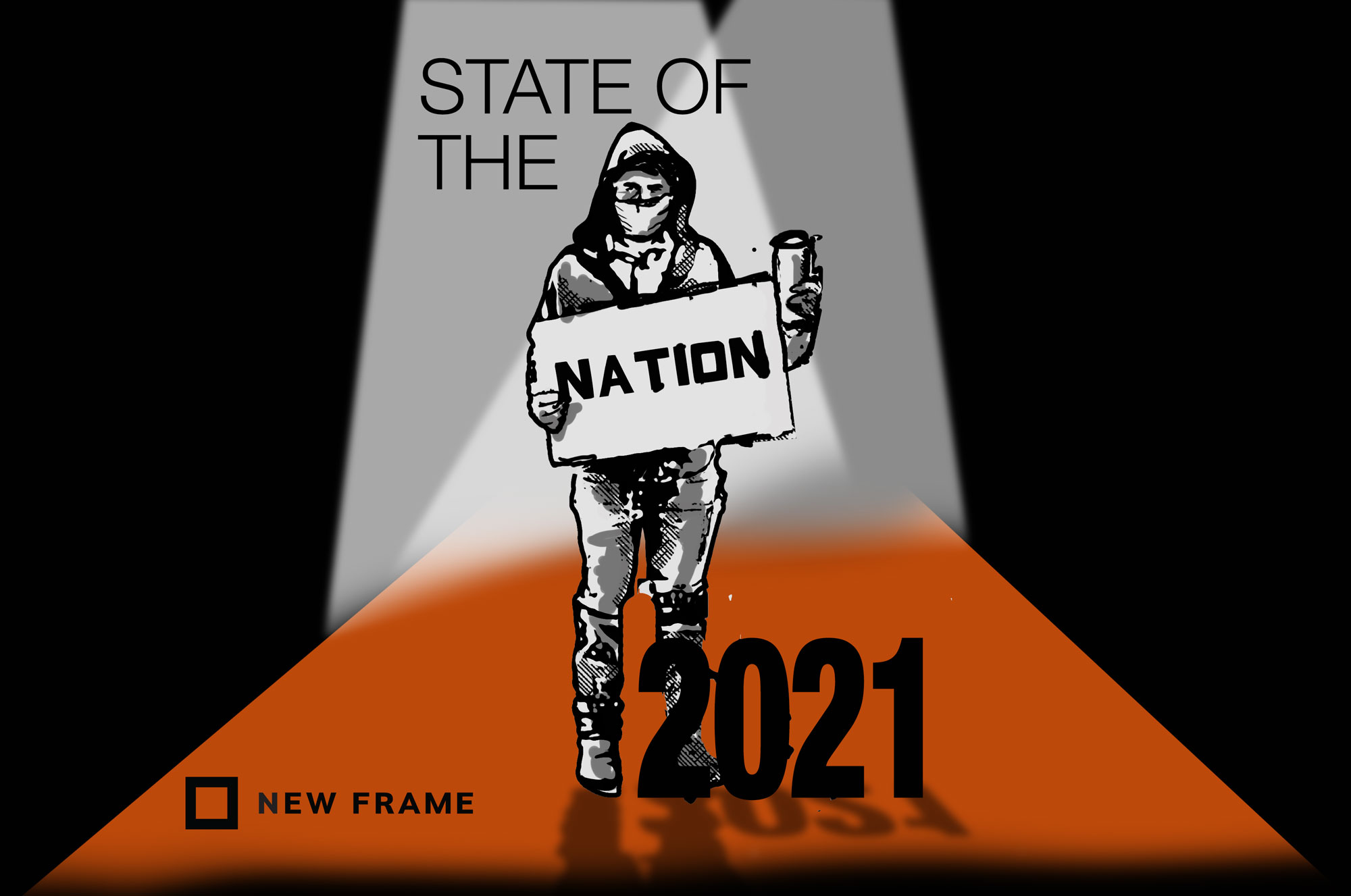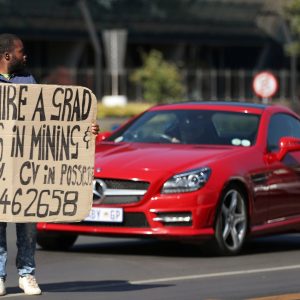Ramaphosa’s shrouded privatisation plans
In an economy bleeding quality jobs, President Cyril Ramaphosa has once again used his state of the nation address to promote neoliberal economic plans that will not benefit the working class.
Author:
23 February 2021

It is becoming a hallmark of President Cyril Ramaphosa’s state of the nation address (Sona) that he announces new privatisation plans in shrouded terms. He announces billions of rands of “investment” by the private sector in key state infrastructure funds without giving any details about what exactly the private sector is paying for, or how it will make a return on its investment.
Ramaphosa has repeatedly mentioned the same multibillion-rand government projects, creating the misleading impression that the government is launching new funds all the time. Again in his 2021 Sona, Ramaphosa spoke of a R100 billion public infrastructure fund. This is the same fund he announced in his 2018 address.
One of the projects the fund will pay for is 300 000 urgently needed student “beds”, according to this year’s Sona. Student accommodation paid for by the Infrastructure Fund was also promised in 2019’s address.
His 2020 Sona said the same fund had “finalised the list of shovel-ready projects” in student accommodation, social housing comprising 37 000 apartments, independent water production, rail freight branch lines, embedded electricity generation, municipal bulk infrastructure and broadband rollout to public facilities.
Related article:
Ramaphosa described these as projects in which the private sector could find “revenue streams”, otherwise known as profit. Involving the private sector in new water projects was a key aim of the Thabo Mbeki government, but it never took flight because of mass opposition by unions and community movements. It was similarly misrepresented in 2021’s Sona as a “measure to support municipalities to address inadequate and inconsistent service delivery” and in the 2020 Sona as “independent water production”.
Ramaphosa sometimes blurs the boundary between public and private finance by using the word “we” to describe projects that will be jointly funded, as if there is no difference between the money coming from the government and from business. For years, he has been using terms like “blended finance” to conceal privatisation. Using this phrasing means Ramaphosa never has to disclose the contractual details of the deals.
Buzzwords and euphemisms
Economist Duma Gqubule has described “blended finance” as simply another “investment banking buzzword”, a “neoliberal pyramid scheme” and a replacement term for the former euphemism for privatisation, the “public-private partnership”.
Talk of “blended finance” creates the impression that the private sector has generously poured some money into a pot of government funds that is now available to pay for the delivery of municipal services to impoverished areas without strings attached.
It is not known how much ordinary people will eventually pay for these services, which will be at least in part privately funded by the R100 billion Infrastructure Fund.
Related article:
In real terms, blended finance is a double whammy for the working class.
Involving private companies means that even the most straightforward procurement or labouring tasks associated with the new building projects will be outsourced to the private sector. The company that gets the contract often subcontracts the work, sometimes multiple times, with each subcontractor setting aside a chunk of their fee as profit. The labourers doing the actual building work then find themselves at the bottom of the pile, on casual or temporary contracts at an extremely low rate of pay.
This has already been the case since 1994 with South Africa’s privatised RDP housing programme. On some projects, there were several different subcontractors building different pieces of one house, each one setting aside a generous chunk of the building fee as profit for themselves while paying the workers a pittance. The result was that many of the houses began falling apart soon after being built and by 2011, the bill to repair damaged houses was estimated at R58 billion. By 2019, the Department of Human Settlements had spent more than R3 billion rectifying about 18 000 of these poorly built houses, with about 12 000 more still needing repairs.
Apart from the potential danger of shoddy workmanship, the infrastructure being built for the working class will ultimately have to be paid for in rents and service charges by impoverished students, shack dwellers and back-yard dwellers, the very people who have either lost their jobs during the pandemic or never had them to begin with and cannot afford to pay.
Alternative solution
There is an alternative. The government could employ engineers, architects, builders, plumbers, electricians and project managers directly in quality jobs.
Instead, when Ramaphosa frames new infrastructure projects as those made possible only by private investment, there is a discursive shift away from talk of decent work or quality jobs.
Quantitative labour market surveys on tiny samples of just 6 000 people sometimes make findings that job losses in formal industries have been offset by an increase in the number of people engaged in sales jobs, desperately hawking Herbalife products, for example.
Related article:
But the labour movement has always been considerably more critical when evaluating what constitutes a decent job. Quality work is permanent, pays above the living wage, includes benefits such as pensions, medical aid, housing and transport allowances, and is on a collectively bargained union contract that provides for yearly, above-inflation wage increases.
National Union of Metalworkers of South Africa (Numsa) spokesperson Phakamile Hlubi-Majola says there is a specific reason for the government using phrases such as “job opportunities” instead of jobs, and that is because “they are not actual jobs. It is always important whenever the government issues a Sona to go back in the past to previous promises about jobs. If you look at where we are now, we are now sitting at 43% unemployment by the expanded definition and the government responds with the word ‘job opportunities’. We need a far more ambitious plan,” she said.
Social compacts
Yet Ramaphosa cannot be accused of unilaterally implementing an accelerated form of privatisation. He says he has consensus through agreement by members of social compacts. Most of these social compact meetings between labour, government and business take place in the National Economic Development and Labour Council (Nedlac) where the so-called partners, with occasional participation by a community sector, have been thrashing out deals since 1995.
Truly representative community-based organisations and social movements like Abahlali baseMjondolo do not have a seat at the Nedlac table, and neither does the South African Federation of Trade Unions (Saftu), which is made up of socialist-leaning unions that broke away from the Congress of South African Trade Unions.
Following this year’s Sona, 36 community organisations called for Nedlac to be immediately defunded and shut down. The organisations, which include the Cala University Students Association, Casual Workers Advice Office, Elsies River Advice Office, Greytown Farm Workers Forum, Izwi Domestic Workers Alliance, Middelburg Advice Office, Southern Cape Community Forum, Orange Farm Advice Centre, Sasolburg Advice Centre and Ubuntu Rural Women’s Movement, also called for the closure of Productivity SA, a government-funded public entity that advises businesses on how to run lean and mean operations.
Nandi Vanqa-Mgijima of the Casual Workers Advice Office says Nedlac is a forum of highly paid staff earning an average salary of R800 000 a year each, “where the working class is routinely sold out by ‘organised labour’ and self-styled, unaccountable ‘community representatives’”.
Related article:
The Nedlac budget of R40 million a year, along with Productivity SA’s R80 million annual budget, should be redirected to the Commission for Conciliation, Mediation and Arbitration (CCMA), which had R600 million of its budget slashed by the government in December.
The cost-cutting measure meant that the CCMA’s walk-in dispute referral facility, which assists 60% of workers referring disputes, closed down abruptly. Part-time CCMA commissioner posts were frozen, despite part-time commissioners hearing 80% of cases. The result is that workers now wait up to several months for straightforward cases to be heard.
Related article:
This is just one example of the disconnect between Ramaphosa and the organisations that represent workers and community members. Numsa is also concerned about Ramaphosa’s Sona announcement that municipalities will be able to procure energy directly from independent renewable power producers.
“While Eskom is not yet being privatised, the job of providing energy is being privatised. There is no evidence anywhere in the world of the private sector providing energy resulting in cheaper costs for the consumer. That has never happened and will never happen,” Hlubi-Majola said.
It is no longer radical to suggest the economic system needs dismantling. The alternative is a privatised future where we elect a government to provide services but discover instead that services are only delivered if private companies tell the government it is profitable to do so.
Update, 3 March 2021: According to CCMA spokesman Amos Tshabalala, part-time commissioners heard 59% of the cases before the commission over the past 12 months and not 80%.





